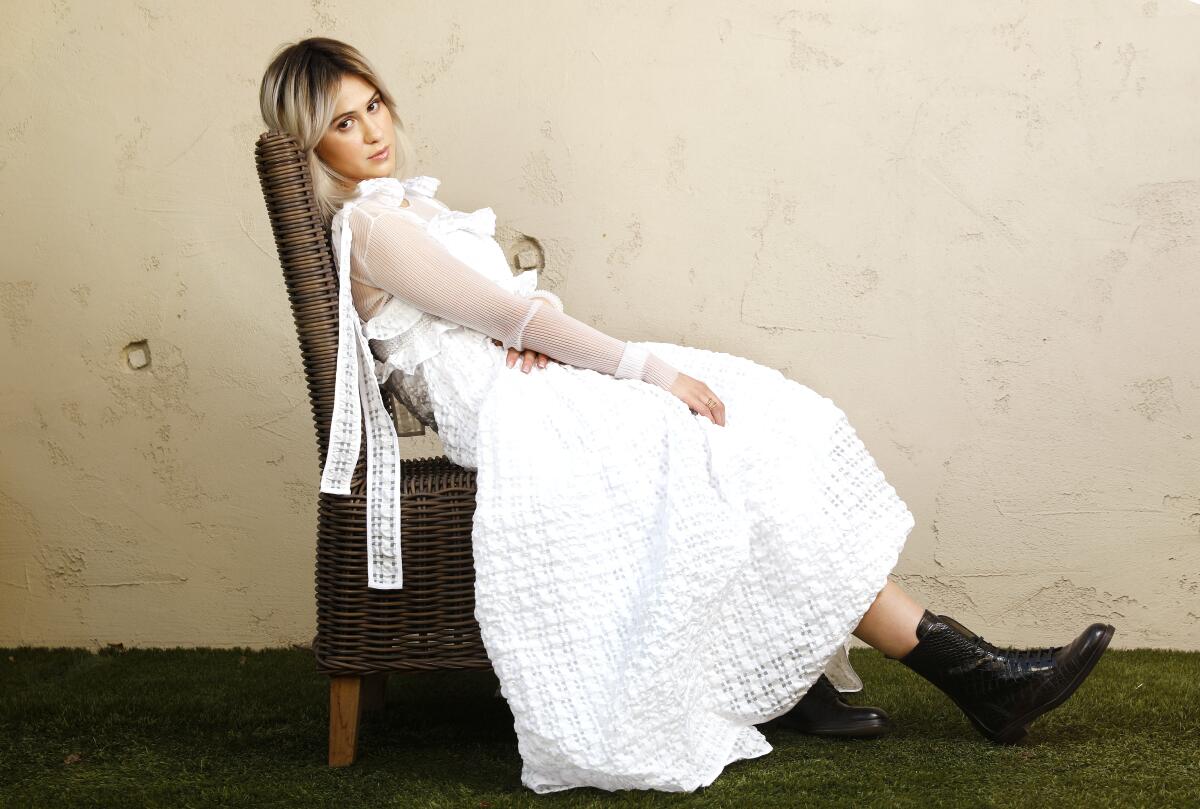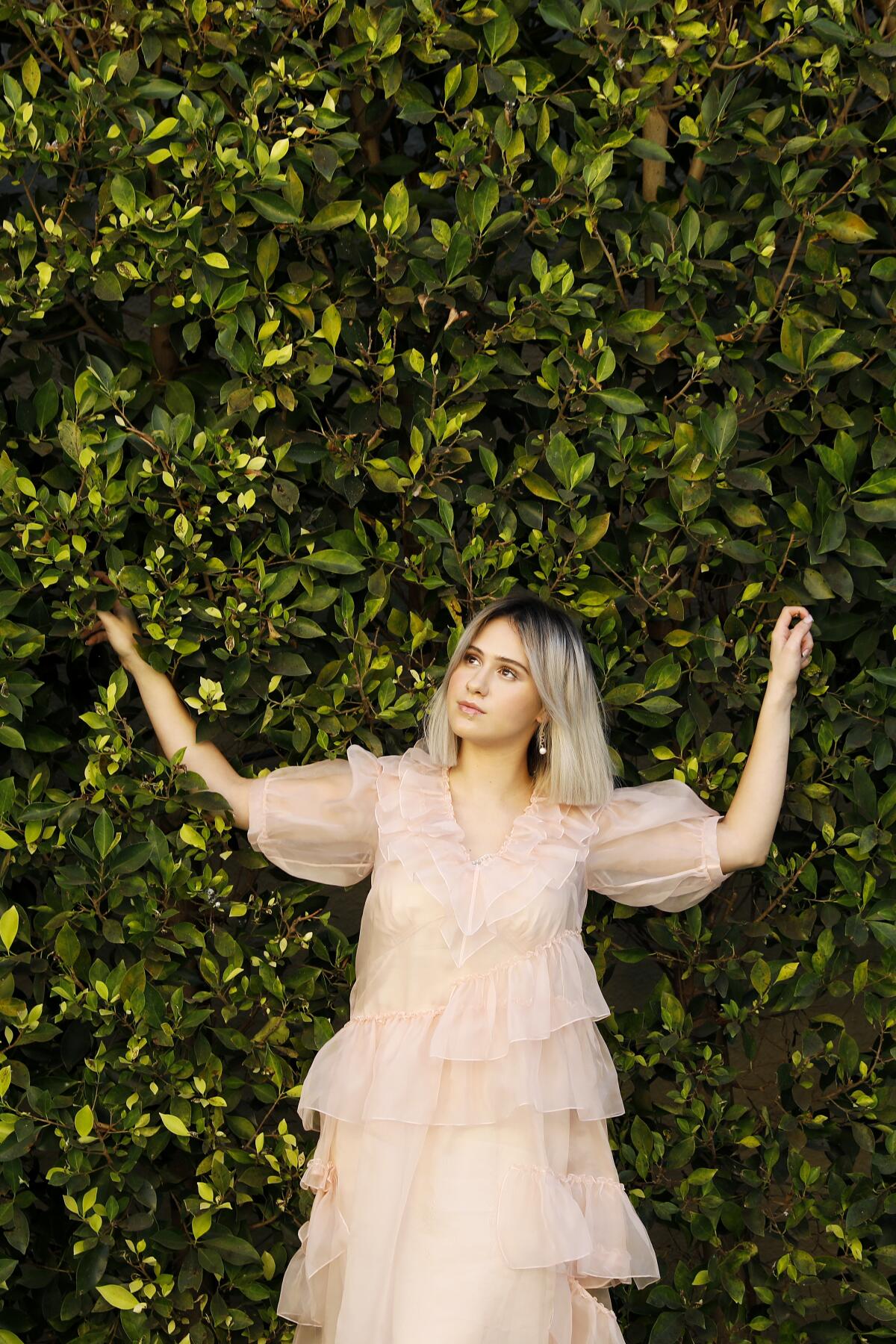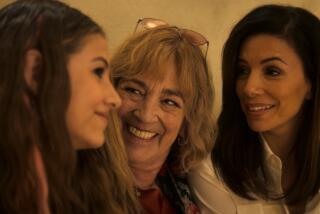Maria Bakalova on empowerment, Rudy Giuliani and the risky business of ‘Borat’

When Bulgarian actress Maria Bakalova auditioned for Sacha Baron Cohen’s “Borat Subsequent Moviefilm” in May 2018, she had no idea how wild the ride was going to get.
“It was my last week of school at Bulgaria’s National Academy for Theater and Film Arts in Sofia, and I heard about it on the last day of the auditions!” says the dynamic 24-year-old during a recent Zoom interview. “I did it on a whim and two weeks later, I was flying to London for the callback.”
Bakalova aced the audition and won the part of Borat’s naïve 15-year-old daughter, Tutar, who is brought to the U.S. to be offered to Vice President Mike Pence as a bribe. The comedy, which premiered on Amazon in October, received raves for the actress’ surprisingly poignant portrait of a young woman who breaks free from her father’s and society’s demeaning, sexist notions. It also made national news for a scene in which Donald Trump’s lawyer Rudy Giuliani invited Bakalova to his hotel bedroom for a post-talk drink, and proceeded to put his hands in his pants. The actress spoke with The Envelope to answer a few of our burning questions:
Before the audition, you had not seen or heard anything about the first “Borat” movie, which was released 14 years ago. When did you realize this new job was going to be very different?
I realized that this was going to be huge when I met Sacha. But I didn’t want to scare myself, so I decided not to watch it until I was offered the part. Because the project was so secretive, they just asked me to do a few lines and my direction was that I was a teenager who just moved to America. I had to improvise. Everything was so secretive that I couldn’t even tell my parents. I kept telling them not to worry and this was going to be a real, legit movie. They had no idea what it was all about until they saw my face in the movie’s trailer!
When we first see Tutar in the movie, she is kept in a cage and horribly mistreated by her father. Was it difficult to play a victimized character like that?
It may be crazy, but I looked at that cage as a metaphor for the patriarchal society. I think about all the moments in my life that I was underestimated because I was a female. We live in 2020, and sadly some misogynistic attitudes from the past still exist. One of the things that really appealed to me about the movie was its message, that we have to treat everyone equally regardless of their nationality, race, gender and sexuality.
What was going on in your mind as you had to pretend to be someone you weren’t while interacting with these strangers?
I heard Sacha say in an interview that sometimes he was confused about whether he was Borat or himself. The same was true for me. You can call it “Method acting!” Quite often, I felt like I was Tutar. After a while, you think it’s a normal day in your life. You also feel so much adrenaline in your body. The excitement, the crazy rush, it’s like you are hypnotized. About half an hour later, you begin to realize what you were doing, and think to yourself, ‘Wow, that was very scary!’”

You have been asked about your scene with Giuliani in previous interviews, and you said that you saw exactly what the audience sees in that scene. Can you tell us what was going on?
I knew who he was. I was afraid because Rudy is a lawyer, and he is the president’s lawyer. I am not an American and don’t know about American politics. But I knew that as an actor, it was my duty to do this scene to save the movie. I also knew that I wasn’t alone in the room because Sacha was hiding there. I knew that if something happened, I could make my exit. But to be honest, my heart was definitely racing because it was an intense situation. The movie has been out for a few months, and everyone can see it and decide for themselves what to accept and believe.
Jeanise Jones, a grandmother who played a babysitter in the new “Borat” sequel, wasn’t in on the joke and was paid $3,600 for her role.
Some of the movie’s most poignant moments are those shared by you and Jeanise Jones, the 62-year-old woman who was recruited to babysit Tutar and teaches her to stand up for herself. After the film’s release, a fundraiser was set up and generated over $140,000 for her. (Baron Cohen donated $100,000 himself). Have you been in touch with her?
Jeanise is a true angel. I will probably always think of her as my godmother, a real hero and life coach. She just wanted to help this girl become a strong woman. We had a real human connection from the very first day we met. I called her on Thanksgiving: It was my first American Thanksgiving and was also my best. I was so happy to talk to her that I started to cry. When we were shooting, it was very hard for me, because I wanted to tell her not to worry about me. She is a really good example of how important it is to be a good person and care about others.
How has the movie changed your life?
I am happy to see how people have responded to the movie and its strong message of female empowerment. I think we are all ready to stand up. Women may be more vulnerable, but I think it’s more powerful to show your real emotions. I really love living in Los Angeles because I love the sun, beautiful nature and people who really care about the environment, and there is such a wonderful variety of food here! COVID has made us realize that loving, touching and kissing each other are the most important things in life.
More to Read
From the Oscars to the Emmys.
Get the Envelope newsletter for exclusive awards season coverage, behind-the-scenes stories from the Envelope podcast and columnist Glenn Whipp’s must-read analysis.
You may occasionally receive promotional content from the Los Angeles Times.








